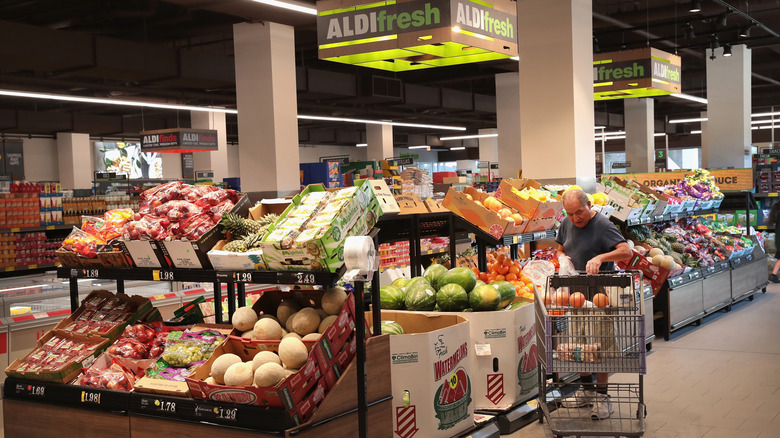Here's The Total Number Of Aldi Stores In America In 2025
Aldi claims the title of America's fastest-growing grocer, drawing shoppers with its focus on quality products at low prices. It also offers an alternative to low-cost warehouse retailers like Costco and Sam's Club for people who don't want to pay a membership fee or don't have the need or storage space for bulk-sized products. The third largest of any grocery chain in the country, there are 2,567 Aldis across the U.S. as of August 19, 2025, coming in ahead of competitors like Publix and Kroger (per ScrapeHero).
Florida has the most Aldis with 273 stores, representing 11% of all locations in the country, and Illinois, home to the company's U.S. headquarters in Batavia, is second with 215. Also in Illinois, Chicago has 32 Aldis, the most of any American city and more than double Philadelphia's 15 in second place. Despite those attention-grabbing numbers, the chain has plenty of room to grow, as 11 states don't have a single Aldi.
The company's U.S. presence began when the discount chain (whose name comes from its German origins) opened its first American store in 1976 in Iowa City. Although that location closed one year later, Aldi continued to expand in Midwestern states. Fast-forward five decades, and Aldi is planning to open a total of more than 225 new U.S. stores in 2025, a number of which will be done by converting some Winn-Dixie and Harvey's Supermarkets, setting a one-year record for the company. That breakneck pace is part of its goal to have nearly 3,200 American Aldis by 2028.
Aldi's requirements for potential store locations as it expands
As Aldi continues its rapid American expansion, the grocery chain looks for possible store locations that are near its customers and logistically able to handle a lot of traffic. Aldi welcomes information about potential store locations on its corporate website, where it lays out its specific requirements. The space has to be about 22,000 square feet with at least 95 parking spaces. The specifications also include that the sites must see passing traffic of more than 20,000 vehicles daily and be in "community and regional shopping districts with convenient access to population."
Aldi's 22,000-square-foot stores are smaller than the average 40,000-square-feet supermarket size — a smaller footprint to speed up and simplify shopping at its locations. It also goes along with the chain's strategy of helping keep prices down by stocking a more limited inventory of what customers buy the most rather than endless options.
Over 90% of its products are also from Aldi's own brands, which is another way it's able to offer low prices. It additionally puts products out in their shipping boxes, cutting the cost of unpacking them and stacking them on shelves. These are among the policies that allow Aldi to have canned foods that sell for less than $1, but it's also why you can't get more savings with standard coupon clipping, as there's only one way to use coupons at its stores.


